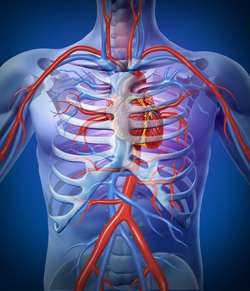(Medical Xpress)—Yale-led research has identified a genetic mutation responsible for the cluster of cardiovascular risk factors that comprise the obesity-related "metabolic syndrome." The study appears in the May 15 issue of the New England Journal of Medicine.
Until now, genetic analysis has been successful in identifying mutations that predispose people to individual risk factors. Success has been more limited, however, in mapping mutations responsible for the constellation of disorders that include obesity, high blood pressure, and elevated blood sugar levels that, when combined, greatly increase the risk of cardiovascular disease, heart failure, and diabetes. Together, these conditions are known as metabolic syndrome.
The researchers studied three large families with familial, or inherited central obesity, early-onset coronary artery disease, hypertension, and diabetes. Using whole-exome sequencing, they identified a so-called "founder mutation"—a genetic abnormality that begins in one ancestor and repeats through successive generations of a family.
The mutation was in the gene Dyrk1B, an enzyme that regulates the balance of muscle to fat as well as stable glucose levels by controlling the signaling pathways. When mutated, the researchers found, Dyrk1B inhibited pathways that keep glucose levels stable, and "turned on" the pathways that promote the production of fat on the body.
The mutation was present in all family members affected by metabolic syndrome, and absent in those who were unaffected.
The researchers believe this mutated gene is the likely reason why patients with it have reduced muscle mass but increased fat mass, even at a very young age. "The entire pathway of this gene seems to be linked with glucose and fat metabolism, through the differentiation of stem cells into muscle, bone, cartilage, and fat tissue," said senior author Dr. Arya Mani, associate professor of cardiology and genetics and member of the Yale Cardiovascular Research Center. "Our findings suggest that mutation in genes that regulate the fate of these cells can result in more fat instead of muscle."
Mani adds that animal studies suggest the activation of genes like Dyrk1B may actually increase appetite and cause weight gain. Therefore, he notes, because the gene is a protein kinase, which modifies other proteins, it may be an excellent target for potential therapies that restore balance and reduce or eliminate the impact of the genetic mutation.
"The advantage of Dyrk1B as an obesity gene is that its inhibition may not only reduce body weight, but favorably affect other risk factors," adds first author Dr. Ali Keramati, resident in internal medicine at Yale School of Medicine.
Journal information: New England Journal of Medicine
Provided by Yale University























